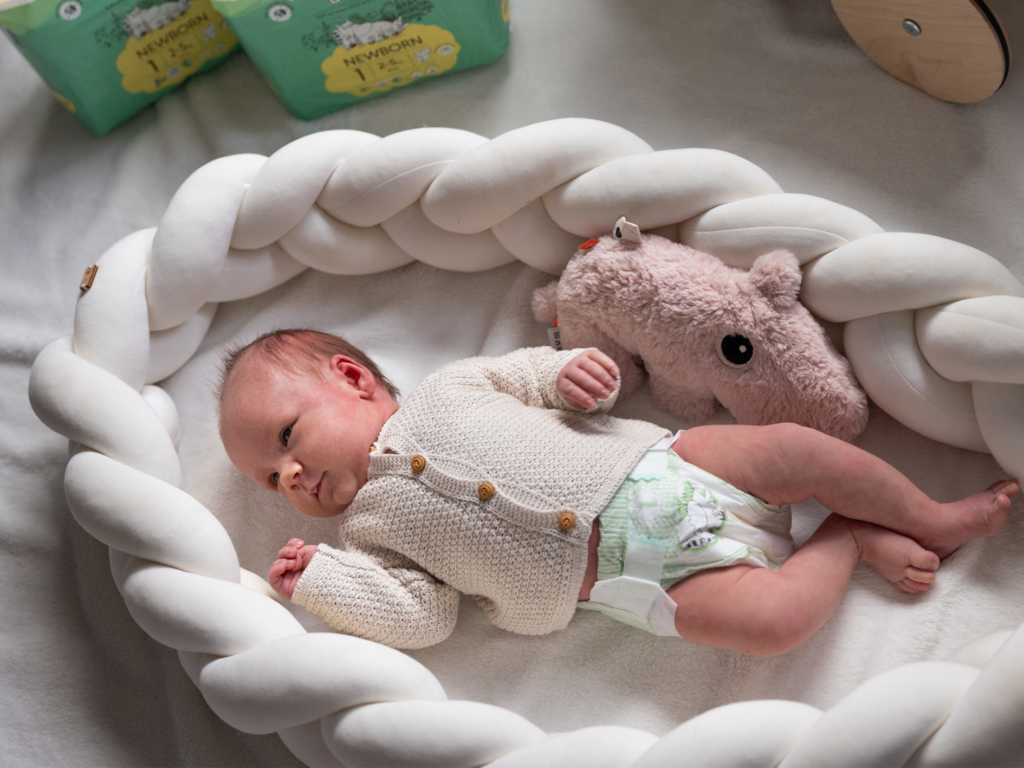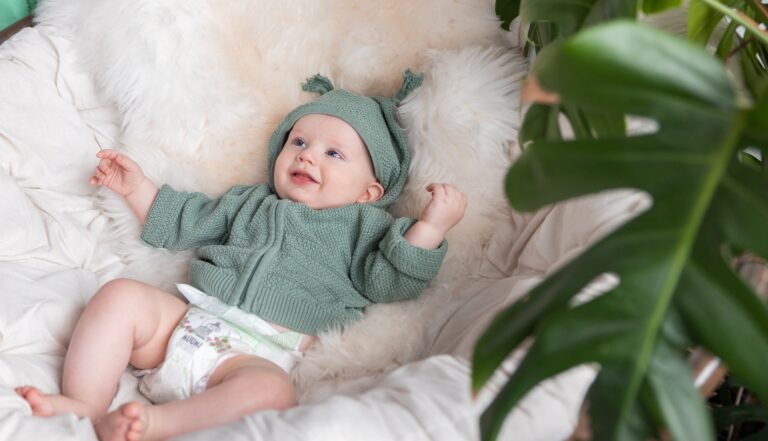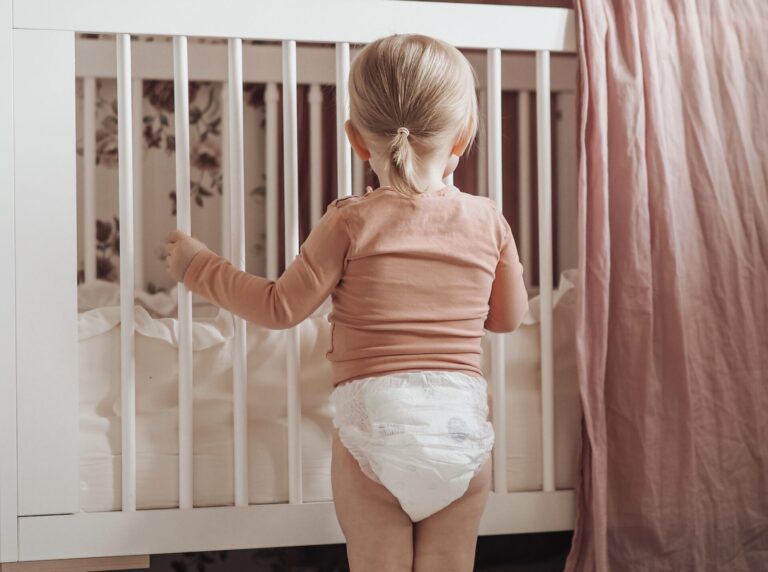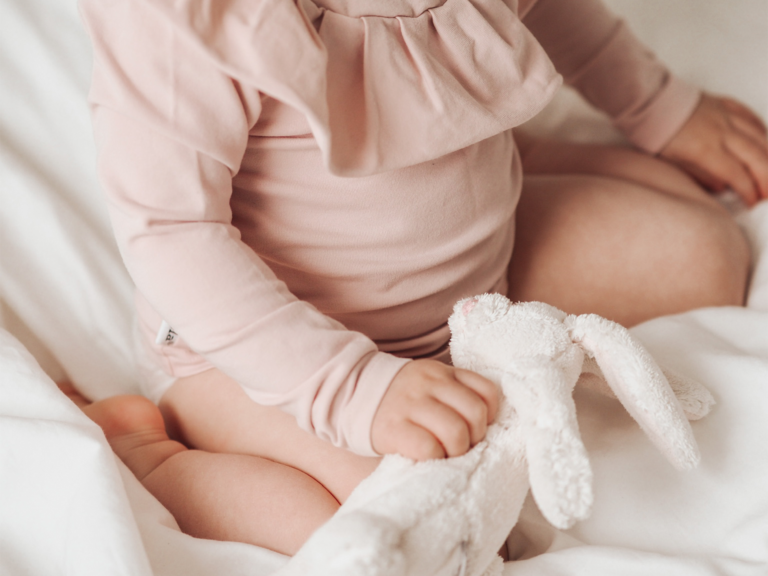Getting the baby to sleep can be challenging for both the parents and the baby. This blog article offers relief to the situation by sharing easy and practical tips for putting a newborn to sleep. These tips are designed to help both you and your baby sleep better and reduce overall stress. Read on for tips on how to ease your newborn’s sleep routine.
What do you need to put a newborn to sleep?
When you want to put your newborn baby to sleep, it is important to make sure that all the necessary preparations are done. This includes a comfortable and safe place to sleep, such as a cot or crib with a suitable mattress and blanket. It is also a good idea to get some soft sheets that will keep the baby warm without them getting too hot.
Soothing objects, such as a sleep buddy or a soft toy, can bring comfort to the baby when going to sleep. However, it is important to note that all soft materials, including stuffed toys, can pose a choking hazard. That’s why it’s important to be careful when using them and follow the safety instructions.
Using a small night light can also help create a calm atmosphere, and it makes it easier for parents to check on the baby without disturbing the baby’s sleep with a bright light. In addition, make sure that you use good quality and effectively absorbent diapers so that the baby stays dry through the night. With the help of these basic accessories, you can create the best possible conditions for a newborn’s peaceful sleep.
Find more tips for better sleep here!
Sounds, music and the use of white noise
Using sounds, music and white noise can be an effective way to help your newborn fall asleep more easily. Many babies sleep better with a steady and soothing sound in the background, such as white noise or soft music. White noise is similar to the sound babies hear in the womb, which can bring comfort and calm the baby.
You can use different devices or apps that play white noise, nature sounds or lullabies. It is important to adjust the volume to a safe level so that it does not disturb the baby’s hearing. In practice, the volume should be so low that you can have a normal conversation with music or sounds in the background.
In addition, calm music before going to bed can be part of the evening routine, helping the baby to calm down and understand that it is time to move to the world of sleep. However, it is important to remember that not all music is suitable to support sleep, so choose only calm music.
The melatonin and endorphins contained in breast milk help regulate the baby’s sleep rhythm and have a calming effect.
Breastfeeding and its effect on newborn sleep
Breastfeeding can significantly affect a newborn’s sleep. It not only provides nourishment for the baby, but also promotes a sense of closeness and security, which is key for calming down. The substances contained in breast milk, such as melatonin and endorphins, help regulate the baby’s sleep rhythms and have a calming effect.
Breastfeeding works as a familiar and comforting routine, which makes it easier for the baby to move from being awake to sleeping. In particular, breastfeeding in a dark room at night helps the baby understand that it is night time and time to sleep, while during the day you may prefer having a brighter environment.
It is important to keep in mind that babies’ sleep patterns vary, and they often need night feeds for the first few months. Breastfeeding before bed can be particularly beneficial as it fills the baby’s tummy and creates a sense of comfort, which can lead to longer periods of sleep. By taking into account the baby’s age and developmental stage, breastfeeding can help create and maintain a peaceful sleeping routine.
Sleeping positions and their significance for the baby’s sleep
Sleeping positions are very important for a newborn’s sleep, as they can affect both safety and the baby’s peaceful sleep. Health authorities around the world recommend putting newborns to sleep on their backs, as this position reduces the risk of sudden infant death syndrome (SIDS). Sleeping on the back keeps the airways open and is the safest position for the baby.
However, while the baby on their back is the best sleeping position for a newborn, it is also important to ensure that the baby’s head is not constantly in the same position, which could lead to flattened head syndrome (plagiocephaly). You can help preventing this by changing the position of your baby’s head every time they sleeps. During the baby’s sleep, it is essential to make sure that they are comfortable and that they do not accumulate too much heat. Avoid using extra blankets and pillows in the bed, and make sure that the baby’s clothing is suitable for both the room temperature and the outside air, so that they do not overheat.
Another important factor is the sleeping environment. The crib or cot should be kept free of extra objects such as toys, pillows and stuffed animals that can increase the risk of suffocation. The baby’s bed should be placed in a quiet place with fresh air and a pleasant temperature. Always follow local instructions and recommendations regarding safe sleeping positions and sleeping environment.

How to manage night wakings?
Night wakings are part of the first months of newborns, but a few tips can help you manage them. First of all, it is important to understand that babies need food often, and waking up at night is part of their normal development. However, you can help your baby learn to distinguish between day and night by keeping the environment bright and active during the day, while at night you should keep the environment dim and calm.
When your baby wakes up at night, try to nurse them effectively and quietly, avoiding extra stimulation such as turning on bright lights or loud talking. After feeding and changing the diaper, put the baby back in their bed to calm down and fall asleep. Although night waking can be challenging for parents, soothing the child in calm and comforting ways can contribute to the baby slowly learning to fall asleep again on their own.
It is also important that the parents divide the nightly tasks evenly so that there is enough time for both to rest. Some families benefit from a “nursing schedule”, where one parent takes care of the baby the first time they wakes up, and the other the next time. Cooperation and support are essential so that the whole family can sleep as well as possible.
Read more about sleep deprivation of a baby or a toddler here!
It is important to keep the evening routine relatively short and predictable.
Tips for a newborn’s evening routine
Evening routines are central to a newborn’s sleep, as they help the baby calm down and prepare for a night’s sleep. To create an evening routine that works, start by reducing stimulation towards the evening: dim the lights, avoid loud noises, and keep activities calm. You can start the routine with a soothing bath, which not only cleans the baby, but also helps them relax.
After the bath, you can spend some quiet time with the baby, holding them or giving a light massage. Continue the routine by dressing the baby in comfortable night clothes and offering dinner or a night feed. Calm music or singing in the background can help create a recognizable signal that it’s time to go to sleep. It is important to keep the evening routine relatively short and predictable. When the same routine is repeated every night, it gradually begins to signal to the baby that it is time to calm down and prepare for sleep. Similarly, it is essential that the evening routine starts at approximately the same time every day so that the biological clock remains regular.
When the evening routine is part of everyday life, the baby knows what to expect, and parents have tools to support the baby’s natural sleep rhythm. At this stage, it can also be good to practice self-control, i.e. if the baby starts to show signs of sleep, it’s time to put them to bed even if you still want to keep them close. A calm evening routine can make the evening and the whole night more pleasant for both the baby and the parents.
How to create a soothing environment for a newborn?
Creating a soothing environment for the newborn is key to good sleep. First, make sure your baby’s sleeping area is quiet, cool and dark. Use curtains or blinds to block light from street lamps or morning sunlight. The environment can also be softened by adding quiet white noise, which mimics the sounds of the womb and helps against external disturbances.
The crib or cot must be safe, without extra pillows, blankets and soft toys that can cause a risk of suffocation. Sheets should be clean and smooth, preferably natural fibers that breathe well and keep the baby suitably warm, not too hot or cold. A soothing bedtime routine can include, for example, a warm bath and a gentle massage to help the baby relax. Some regular activity, such as singing, can also signal to the baby that it is time to sleep.
It is important to understand that babies are individuals, and what soothes one baby may not work for another. Try different approaches and keep the ones that seem to work best. A calm and predictable environment helps your baby learn the valuable skill of falling asleep, which will benefit them throughout their life.
Check out our tips for building a safe and comfortable room here!
A good nap can also have a positive effect on sleep at night.
The significance of naps for a newborn
A newborn’s nap is of great importance in terms of growth, learning and development. Since babies sleep most of the day, naps are a key part of their daily routine. Essential developmental processes take place during daytime sleep, such as shaping of the brain and strengthening of memory. In addition, when sleeping, the body repairs itself and supports physical growth.
When the baby sleeps during the day, it is important to create a calm sleeping environment. This can mean a dark room or a crib in a bright space that protects from the surrounding noise and light. A regular bedtime schedule helps your baby figure out when it’s time to rest, while reinforcing their natural sleep rhythm. The length and number of naps can vary greatly depending on the baby’s age and individual needs. Some babies benefit from one long nap, while others may need several shorter naps.
Parents should monitor the signs of the baby’s tiredness and learn to recognize when it is an appropriate time to guide the baby to a nap. Good naps can also have a positive effect on night sleep, so their importance should not be underestimated. Regular and restful naps help ensure that your newborn gets enough rest to support their rapid development.
Read more about baby’s sleep at 1 month here!
How do Finnish Moomin Baby diapers support a newborn’s sleep?
When supporting a newborn’s nighttime sleep, it is important to also pay attention to diapers, because a comfortable and dry feeling has a significant impact on the quality of uninterrupted sleep. Finnish Moomin Baby diapers take into account babies’ sensitive skin and the need to stay dry all night. These diapers are made only from soft and breathable materials, which reduces the risk of rashes and chafing.
The key feature of Moomin Baby diapers is excellent absorption, which ensures that moisture moves away from the baby’s skin and locks it inside the diaper. This reduces the risk of waking up with an uncomfortable wet diaper. In addition, diapers are made from pure raw materials without additional chemicals, such as creams, perfumes or chlorine. Finnish Moomin Baby diapers can therefore be a significant help in supporting better sleep for newborns, as they keep the baby dry, comfortable and protected throughout the night. Improved baby sleep can, in turn, bring parents well-deserved rest.
We welcome you to try Moomin Baby diapers by ordering a free Diaper hero sample here!












